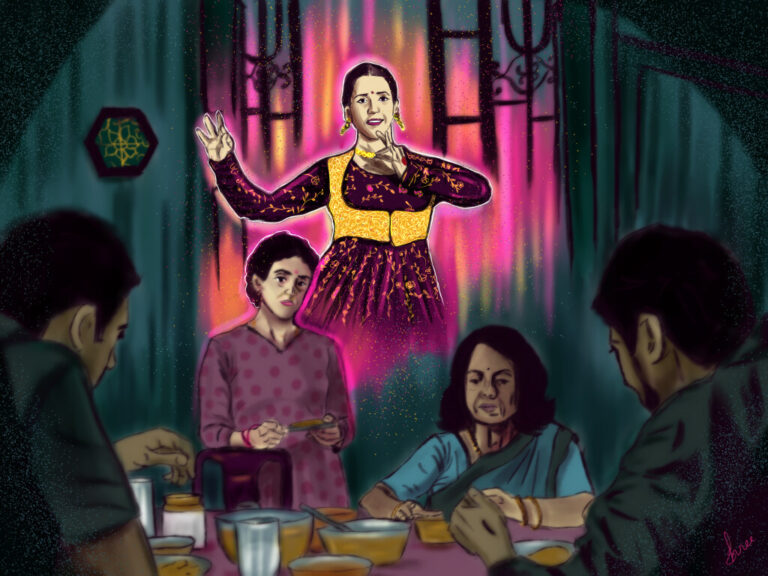An Analysis of ‘Quissa – The Tale of A Lonely Ghost’
Srividya Kripakar is a gold medalist in women’s studies. Diversity and inclusivity in workplace consultant, she writes on Feminist Literature, Films, Art, and New Media
This article analyses the film, ‘Qissa’ (2013), a Punjabi film, starring Irfan Khan, Tiscca Chopra, Tilottama Shome, and Rasika Duggal, directed by Anup Singh. It is the story of Umber Singh, a patriarch dealing with the scars of the India-Pakistan separation, who raises his fourth girl child as a boy, unwilling to accept her as a girl. Some films will always remain in our memory even after many years of their release, this film is one such. The beauty of the film is the layered approach to screenwriting. Qissa is a less explored film with its non-dogmatic approach. It provides a canvas for the discourse on gender fluidity and patriarchal stereotypes. It might appear a tad slow for the first-time audience, but the story sinks in and lingers in your mind for a few days after watching it. Narrated by a ghost, it surely does not haunt the audience but makes them think.
Plot
In post-independence, post-partition India, Umber Singh (Irfan Khan), his wife Mehar (Tisca Chopra), and his three children are forced to migrate from Pakistan, his place of birth, to India’s Punjab in 1947. After three daughters, he obsessively awaits a male heir. When his fourth daughter is born, he starts deluding. He decides to raise her as a boy, Kanwar Singh. Umber’s wife Mehar and their three older daughters are silenced into accepting Umber’s delusional behaviour. In time, Kanwar grows up and becomes a truck driver. When Kanwar is married to Neeli, the plot intensifies. Umber’s obsession with a male heir, leads him to attempt to rape Neeli because he knows Kanwar cannot impregnate her. To save Neeli from his father, Kanwar shoots him. After Umber succumbs, Kanwar and Neeli escape to Mehar’s maternal village.
Neeli and Kanwar profess their affection for each other and start living as women. Neeli motivates Kanwar to embrace his real identity and shed the forced manhood. But Kanwar suffers from an identity crisis. Kanwar is haunted by his father’s ghost. Umber’s ghost is shown to take over Kanwar’s body to fulfill his wish for a male heir. When he again attempts to seduce Neeli, she jumps to her death, leaving Umber all by himself, wandering as a lost soul with his unfulfilled desire to have a son to carry his family lineage.
A microcosm of social realities
Qissa is a surrealistic story, depicting the deep-rooted desire for a male heir in Indian society. The film, set during the aftermath of partition, subtly shows how migration has a psychological impact on the refugees, the anguish of alienation from one’s land, and uncertainty about the future. Indian films exploring the themes of migration during partition, mostly explore the theme of the abduction of women and their recovery subsequently. Here, the violence perpetrated by Umber Singh on the women of his family is psychological, they too are held hostage by his unrealistic beliefs. But the poignant tale of Qissa portrays partition as a catastrophe seated into the memory in the form of lifelong psychological trauma on individuals. , with lifelong psychological trauma on individuals. Subtlety is the strength of Qissa, it does not aestheticize violence, like other films in this genre.
The initial scenes show Meher, wife of the protagonist Umber, delivering their third child, all in the mayhem of partition. When she asks her husband whether he wants to see their daughter or not, he shows disinterest in even seeing the child. From there begins our journey of understanding Umber’s psyche, his obsession for a son, and his delusional behavior of absolutely believing that his fourth biological daughter would be a son in all ways, forcing the women in the family also to be a part of his unreal belief.
Qissa, or fable, as the name of the film suggests, has used the canvas of Indian folklore. The story is narrated by a ghost and is a microcosm of a bigger social reality which is a preference for sons over daughters.
Intersectional identities of characters
Gender stereotypes, performativity, passive abuse, and misogyny, are various layers interwoven in the narrative. Kanwar is visibly aware and confused about his/ her gender and Sexuality. The passive acceptance, of Umber’s delusional and irrational behavior by his family, reflects the domination of hegemonic masculinity and subordination of femininity, widespread in Indian society.
The term intersectionality was coined by Kimberlé Crenshaw in the year 1989 to describe how race, class, gender, and other individual identities of a person intersect with one another and overlap. Here Kanwar’s identities of non-conforming biological sex/gender, and sexuality overlaps, and Umber’s migrant identity and male-heir obsessed patriarch’s identity overlap. The characters’ responses to situations are dependent on their overlapping identities, discriminations, and privileges arising from the intersections of their identities. Umber attempts to rape Neeli when she tries to escape, a last desperate attempt to bring a male heir to the family and Kanwar kills his beloved father, for whom he had performed as a son for so many years, to save Neeli; This act brings out his suppressed feelings of anguish, anger, frustration, and disappointment; the pivotal point when Kanwar Singh becomes Kanwar Kaur. But her newly found freedom does not give her peace as she finds it hard to slip into the role of a woman.
Gender is a learned behavior; the continuous conditioning and internalization of social norms make an individual a man/ boy or woman/ girl.
Doing gender
Judith Butler has collapsed the sex/ gender distinction to argue that there is no sex that is not always already gendered. All bodies are gendered from the beginning of their social existence (and there is no existence that is not social), which means that there is no ‘natural body’ that pre-exists its cultural inscription. This seems to point towards the conclusion that gender is not something one is, it is something one does, an act, or more precisely, a sequence of acts, a verb rather than a noun, a ‘doing’ rather than a ‘being’ (Butler, 1999)
It is Umber Singh the patriarch, who proclaims Kanwar as a son and expects him to conform. It is the patriarchal society that frames the gender norms and expects its members to conform, how much ever forceful it might be.
The Cast and Performances
Irfan Khan in the role of Umber delivers a nuanced performance. The actor succumbed to cancer in 2020, but he will always be remembered for his performances onscreen. He has absolute control over the various layers of Umber’s character when he oscillates between delusional, chauvinistic, obsessed aspects of the patriarch’s psychology. It is his performance that haunts the viewers and creates a profound impact.
Tilottama Shome has delivered a striking performance; she has brought out the confusion and the identity crisis of Kanwar remarkably. She has expressed both the privilege of a man, and the vulnerability of a woman and also transcended binaries, embracing the queer identity remarkably.
Conclusion
The article has analyzed the feature film Qissa, dissecting its layers. Visual arts possess the power to extend the feminist discourse in the public sphere, provided the makers consciously understand the social realities. A heteronormative, patriarchal society expects conformity and adherence to social norms, and films play a significant role in breaking social stereotypes. Films like ‘Qissa’ are boxed under the genre of parallel cinema and the mainstream audience finds such creative content rather confusing than interesting. Deconstruction and analysis of visual art, give a new perspective to the audience on gender concepts and their own lived experiences. With the advent of OTT platforms and YouTube, such films have reached the audience breaking the regional and language barriers.
References
- Singh, A. (2013). Qissa – The Tale of a Lonely Ghost [Film]. India.
- Butler, J., 1999. Gender trouble. New York: Routledge.








